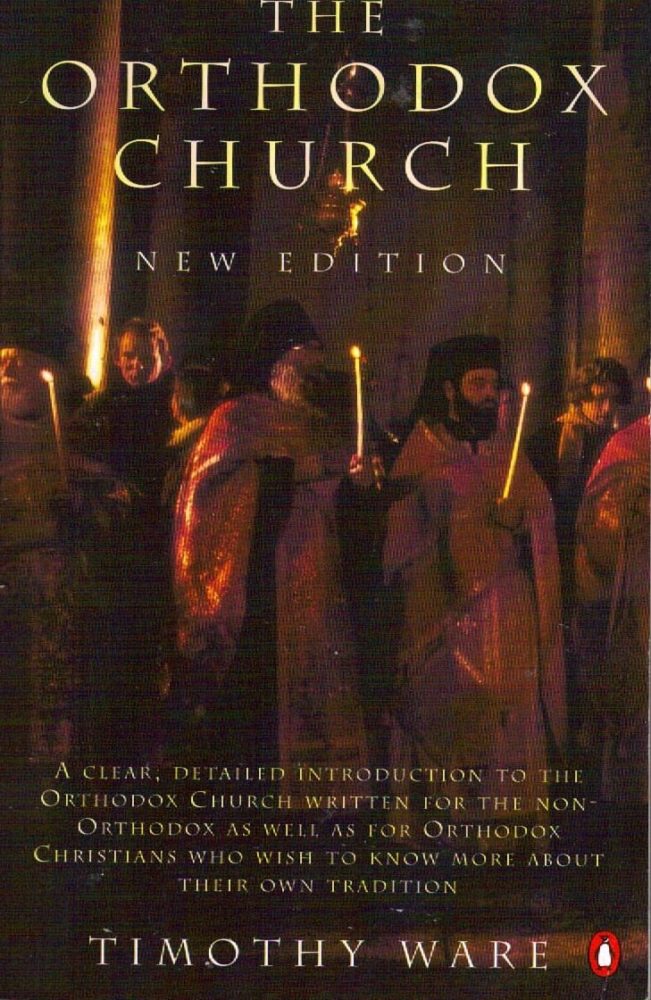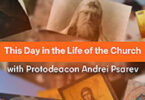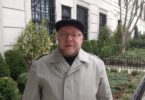The first encounter of Metropolitan Kallistos with Orthodoxy was at a London church on Buckingham Palace Road where services were alternated between the Synodal and the Patriarchal communities. It is hard to tell now which one of these had the All-Night Vigil when 17-year old Timothy Ware happened into the church on “one Saturday afternoon in the summer of 1952.
The first encounter of Metropolitan Kallistos with Orthodoxy was at a London church on Buckingham Palace Road where services were alternated between the Synodal and the Patriarchal communities. It is hard to tell now which one of these had the All-Night Vigil when 17-year old Timothy Ware happened into the church on “one Saturday afternoon in the summer of 1952.”[1]Bishop Kallistos of Diokleia, “Strange Yet Familiar: My Journey to the Orthodox Church,” The Inner Kingdom (Crestwood, NY: St. Vladimir’s Seminary Press, 2001) … Continue reading
Five years later Timothy found himself in another émigré church in Versailles near Paris, where St. John of Shanghai was celebrating the Divine Liturgy. As Metropolitan Kallistos tells in his essay on his journey to Orthodoxy (cited throughout this article): “I arrived near the end of the service, shortly before the moment when he emerged to give communion. No one came forward to receive the sacrament, but he remained standing with the chalice in his hand; and with his head on one side in his characteristic way, he stared fixedly and even fiercely in my direction (he had never seen me before). Only when I shook my head did he return to the sanctuary with the chalice.”[2]Ibid. http://www.myriobiblos.gr/texts/english/wear_journey2.html (Nov. 12, 2008) Nevertheless St. John anointed him with the oil at the end of a moleben that followed the liturgy. “What the truth of the matter, – recalls Metropolitan Kallistos – my experience at Versailles strengthened my feeling that the moment had come for action. If Orthodoxy is the one true Church, and if the Church is a communion in the sacraments, then I needed above all else to become an Orthodox communicant.”[3]Ibid.
The next year he was received in Orthodoxy by Bishop James of the Patriarchate of Constantinople. The reason why he decided not to be received into the ROCOR is rooted in his double loyalty to this Church of Russian refugees and to world Orthodoxy. On the one hand he admired the ROCOR for its perseverance of monastic and ascetic heritage, for the veneration of New Martyrs of Russia, but on the other hand Timothy was disturbed by its increasingly growing isolationism and was confused by the relations among Russian jurisdictions in the immigration. Therefore, Timothy was delighted when the Greek bishop instructed him to go for his spiritual needs to Fr. George Cheremteff (+1971), a ROCOR priest, at the cathedral in London. [4]A biography of Fr. George can be found in Pravoslavnaia Zhizn 6 (Jordanviile: Holy Trinity Monastery, 1997).
Since Metropolitan Laurus had mentioned to me that Timothy Ware had done research at the library of Holy Trinity Seminary, at my meeting with Metropolitan Kallistos in June, 2008 I asked him about his visits to Jordanville. Here is what he related: “In 1959-60 I was a research fellow at Princeton. I wrote to Fr. Konstantin Zaitsev and asked whether I could come. I received an invitation from him and spent three weeks at the monastery during the summer. I have visited Jordanville three times, and totally I spent there five weeks. There were about 40 monks at that time, and the abbot was Archbishop Averkii. Father Konstantin Zaitsev was quite strict about church matters. Fr. George Grabbe, whom I met at the Synod, was quite unhappy with Fr. Konstanin’s views. The seminary maintained high standards of Russian studies. I met a student there who had already started as a seminarian and having been dissatisfied with the quality of teaching left for the Russian department of one of the universities. However, the standards of teaching at that place were lower than in Jordanville, and that fellow came back. ”
After his return to England Timothy was invited to join the monastic brotherhood of Archbishop Vitaly Ustinov, who was looking for monastic candidates in various quarters of the world. Timothy spent six month at the podvor’e in Montreal and Holy Transfiguration Skete. Having been an intellectual person all his life, Timothy missed his studies very much. In the same conversation with me Metropolitan Kallistos fondly recalled his time with Archbishop Vitalii and told this story. Once during a meal the brethren discussed the status of non-Orthodox, and Vladyka Vitalii said, “There are gifts of real sanctity among simple people, but not in the mysteries.” Metropolitan Kallistos also related the other story about Archimandrite Vitalii when he shared the church in London with Fr. Anthony Blum of the Moscow Patriarchate. The latter told Metropolitan Kallistos that he once asked Fr. Vitalii what he thought of him. ‘If I wanted to be polite I would say: ‘You are not a priest’,’ Vitaly responded. ‘But I will give you a straight answer: ‘If you are under Moscow, you are a priest of Satan!’ ‘[5]I reproduce this words from the following article: Felix Corley, “Metropolitan Vitaly Ustinov Russian Orthodox leader in exile,” Felix Corley, Independent (28 Sept., 2006) … Continue reading Despite this tunnel-vision-ecclesiology, based on personal experience Metropolitan Kallistos supposes that Archbishop Vitalii might have a gift of insight. It is interesting to note that in his second, 1964 edition of The Orthodox Church the author is mentioned as “working in Montreal for the Russian Orthodox Church in Exile.” In 1964 he left Canada, and in the same year Eustratios Argenti: A Study of the Greek Church under Turkish Rule was published. Archbishop Vitalii received into the Orthodox Church Gerald Palmer and M-me Kadloubovsky, translators of Philokalia, who after the death of Fr. George Cheremeteff became Bishop Kallistos’ spiritual children.
Fr. George Cheremteff did not bless Timothy to be ordained in the ROCOR, because “a very narrow minded spirit is taking place, and the younger bishops will be too narrow for you.”[6]Personal Communication. June 2008. In 1966 Timothy Ware was ordained a priest and tonsured a monk in St. John’s Monastery on Patmos. As a lay person Timothy Ware attended services in the cathedral and convent for seven years, and when he became a priest-monk he helped Fr. George to serve at the convent. Around 1970 Fr. Panteleimon of Boston’s Holy Transfiguration Monastery happened to be in the church, where Fr. Kallistos served, and was very upset that a clergyman of the Patriarchate of Constantinople was serving in the ROCOR church. Five years later the abbot of the Monastery of Sts. Kyprianos and Justina in Greece, Archimandrite Kyprianos, in his letter of 17 June of 1975, complained that Father Kallistos used to serve from time to time in the Annunciation Convent in London (ROCOR).[7]Stanford University Library. Department of Special Collections, The Bishop Grigorii Papers [M0964]. Box 3, Folder 7: Grabbe to Various Addresses. This is probably a letter to Father George Grabbe. Thus Fr. Kallistos ceased to serve there. It is also necessary to mention that in his periodical Eastern Churches Review Metropolitan Kallistos always gave space for the representation of the ROCOR position on topical issues.
References
| ↵1 | Bishop Kallistos of Diokleia, “Strange Yet Familiar: My Journey to the Orthodox Church,” The Inner Kingdom (Crestwood, NY: St. Vladimir’s Seminary Press, 2001) http://www.myriobiblos.gr/texts/english/wear_journey1.html (Nov. 12, 2008) |
|---|---|
| ↵2 | Ibid. http://www.myriobiblos.gr/texts/english/wear_journey2.html (Nov. 12, 2008) |
| ↵3 | Ibid. |
| ↵4 | A biography of Fr. George can be found in Pravoslavnaia Zhizn 6 (Jordanviile: Holy Trinity Monastery, 1997). |
| ↵5 | I reproduce this words from the following article: Felix Corley, “Metropolitan Vitaly Ustinov Russian Orthodox leader in exile,” Felix Corley, Independent (28 Sept., 2006) http://www.independent.co.uk/news/obituaries/metropolitan-vitaly-ustinov-417796.html (Nov. 12, 2008) |
| ↵6 | Personal Communication. June 2008. |
| ↵7 | Stanford University Library. Department of Special Collections, The Bishop Grigorii Papers [M0964]. Box 3, Folder 7: Grabbe to Various Addresses. This is probably a letter to Father George Grabbe. |












I have a few additional comments with regard to your account.
In your first paragraph, you say that it is difficult to know whether the service that I originally attended at St Philip`s Buckingham Palace Road, was celebrated by the Synodal or by the Patriarchal jurisdiction. In fact, it was certainly celebrated by the Synodal clergy. There were two priests, with long beards, as well as a deacon. I went back the following Saturday, and the service was celebrated by a single priest without a beard: this was Fr (later Metropolitan) Antony Bloom. Then I returned for a third time on the following Saturday, and the service was celebrated by the two bearded priests with the deacon. From this it is clear that at the first service the officiating clergy belonged to the Synodal jurisdiction.
As regards the story that you recount in the fifth paragraph of your narrative, concerning the conversation between Fr Antony Bloom and Fr Vitaly, I am interested that you found it recorded in an article by Felix Corley. I myself heard the story both from Metropolitan Antony and from Metropolitan Vitaly; and their accounts agreed with each other. As I remember, Fr Vitaly put his statement in this form: `At best, you are no priest at all; at worst, you are the conscious and deliberate servant of Satan.` This is not quite the same as Corley`s wording, but the substance agrees with it.
When I originally went to Montreal in November 1963, both Metropolitan Vitaly (or Archbishop, as he then was) and I myself envisaged the possibility that I might stay there permanently and become a monk there. In the event, both he and I realised that this was not the right course; and that is why I returned to England in May 1964. He himself said to me, `Go back to the Greeks.`
The story which you tell about our mealtime conversation can be expanded as follows. One of the monks said, `The non-Orthodox do not have the grace of the Holy Spirit.` I then spoke up, saying, `I myself have been a non-Orthodox, and from my personal experience I must testify that there is indeed grace of the Holy Spirit among the non-Orthodox.` There was a long and awful pause. Eventually Vladika Vitaly said (somewhat to my surprise), `Brother Timothy is right. There are gifts of real sanctity among simple people in the non-Orthodox communities, but of course we cannot speak of them possessing valid sacraments.` Vladika Vitaly grew up in France as an exile, and I think that he received kindness from certain Roman Catholics; this is probably the reason why he spoke as he did.
In your final paragraph, you correctly recount the story of Fr Panteleimon of Boston being present in 1970 at a Liturgy in the London convent which I celebrated. I should add that my celebrations at the London convent took place with the knowledge and blessing of the local ROCOR hierarch, Archbishop Nikodim. He also invited me to serve with him at the ROCOR cathedral in London. What Fr Panteleimon said to me was, `This can only be allowed by an extreme application of economy. It will soon be terminated.` A few months later a letter came from the head of ROCOR, Metropolitan Philaret, addressed to the abbess of the London Convent, Mother Elisabeth. He wrote, `It will be best if you do not invite Fr Kallistos too often to celebrate the Liturgy in the Convent.` He did not actually say that I should `never` be invited; but Mother Elisabeth and I agreed that he clearly was not happy about my officiating in the Convent, and so it would be best for me to cease doing so. I continued to make regular visit to the Convent, out of friendship, but I did not officiate further. When Fr Kyprianos wrote in 1975, I had long since already ceased to officiate at the Convent; so his letter (of which I did not previously have knowledge) had in fact no practical effect.
I am searching for a booklet written by Bishop Kallistos Ware entitled: THE SEED OF THE CHURCH, THE UNIVERSAL VOCATION OF MARTYRDOM. My priest, Fr. James Bernstein would like to have a few copies for parishioners in our church, St. Paul Antiochian Orthodox Church here in Lynnwood, Washington, USA.
Any help you can offer would be greatly appreciated!
Thank you!
“Father Konstantin Zaitsev was quite strict about church matters. Fr. George Grabbe, whom I met at the Synod, was quite unhappy with Fr. Konstanin’s views.”–
What views in particular, and why was he unhappy with them, if I may ask?
Dear Arkady, great to hear from you. At the discussed point Fr, George Grabbe did not approve Fr. Konstantin’s isolationism in regard of other Orthodox Churches.
It was of interest to me the role of Abbess Elizabeth in London having Metropolitan Kallistos serve her monastery. The main thrust for this continued bond was keeping the prayer life of the monastery intact amid these political and sometimes prideful struggles. I pray our Lord will send us humbly intelligent clergy to serve in our monastic community to help us be stronger in our faith and witness in a God pleasing manner.
“Archbishop Vitalii received into the Orthodox Church Gerald Palmer and M-me Kadloubovsky, translators of Philokalia…”
Indeed, in 1949, in London, the then Archimandrite Vitaly did receive into Orthodoxy Gerald [George] Palmer. Then, in 1951, Archimandrite Vitaly also received into Orthodoxy the sister of Gerald, Elizabeth Palmer. However, it is probable that Madame Eugenia Kadloubovsky, born in 1892 in Reval (Tallinn), had been Orthodox for all her life.
I am putting together materials about the life of Mdme. Kadloubovsky (also known as Kadleigh). I would be grateful if your readers have any suggestions about sources which I should pursue.